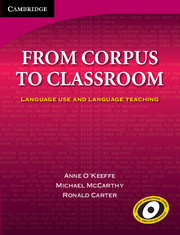Book contents
- Frontmatter
- Acknowledgements
- Contents
- Preface
- 1 Introduction
- 2 Establishing basic and advanced levels in vocabulary learning
- 3 Lessons from the analysis of chunks
- 4 Idioms in everyday use and in language teaching
- 5 Grammar and lexis and patterns
- 6 Grammar, discourse and pragmatics
- 7 Listenership and response
- 8 Relational language
- 9 Language and creativity: creating relationships
- 10 Specialising: academic and business corpora
- 11 Exploring teacher corpora
- Coda
- References
- Appendix 1
- Appendix 2
- Appendix 3
- Author index
- Subject index
- Publisher's acknowledgements
10 - Specialising: academic and business corpora
Published online by Cambridge University Press: 23 December 2009
- Frontmatter
- Acknowledgements
- Contents
- Preface
- 1 Introduction
- 2 Establishing basic and advanced levels in vocabulary learning
- 3 Lessons from the analysis of chunks
- 4 Idioms in everyday use and in language teaching
- 5 Grammar and lexis and patterns
- 6 Grammar, discourse and pragmatics
- 7 Listenership and response
- 8 Relational language
- 9 Language and creativity: creating relationships
- 10 Specialising: academic and business corpora
- 11 Exploring teacher corpora
- Coda
- References
- Appendix 1
- Appendix 2
- Appendix 3
- Author index
- Subject index
- Publisher's acknowledgements
Summary
Introduction
As we saw in Chapter 8, looking at small specialised corpora (such as shop encounters, radio interactions, family conversations, business meetings, and so on) can lead to insights that cannot as easily be gained by looking at large general corpora. In this chapter we build on this by taking two examples of more specialised areas of language and looking at how corpora can help us better understand how they work, and what distinguishes them from more general, everyday types of language. Specialised corpora have a number of advantages. Firstly, because they are carefully targeted, the data they consist of is likely to represent the target domain more faithfully than corpora which set out to capture everything about a language as a whole. Secondly, specialised lexis and structures are likely to occur with more regular patterning and distribution, even with relatively small amounts of data. Thirdly, the pedagogical goals in terms of how they are used and applied are likely to be easier to define and delimit. The two areas we examine in this chapter are academic English and business English. In the case of academic English we contrast spoken and written data, while in the business domain we look at a specially constructed spoken business English corpus and then compare it with the spoken academic corpus.
Written academic English
Academic English has been well studied, especially in terms of written forms and styles.
- Type
- Chapter
- Information
- From Corpus to ClassroomLanguage Use and Language Teaching, pp. 198 - 219Publisher: Cambridge University PressPrint publication year: 2007
- 1
- Cited by



